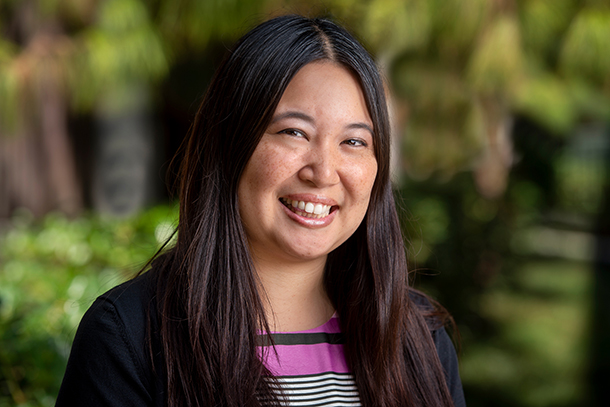Jennifer Hsia, USC Student Health’s new behavioral health consultant, knows there are students who don’t seek the help they need for mental health issues.
It could be due to cultural or gender expectations, social pressure to present an image of infallibility or any other number of reasons. But that reluctance usually doesn’t extend to their physical health issues.
“Some people are taught that we should be able to fix our thoughts and feelings ourselves,” Hsia said. “But when our arm is broken, we wouldn’t not go to a doctor, and our arm is just as much a part of ourselves as our thoughts and feelings.”
Hsia, who started at USC in July, will be a bridge between medical and mental health services for student patients. Her role as a behavioral health consultant was developed collaboratively between medical and mental health teams in USC Student Health, working on an integrative approach to patient care.
“Our most frequent contact with our patient population often comes in through the medical care side,” said Sarah Van Orman, USC’s chief student health officer. “When there’s an opportunity to provide mental health consultation to improve patient well-being, having Jennifer as a resource in clinical care serves as in important bridge between the two service areas.”
New behavioral health consultant role recognizes link between mind, body
The newly created role and developing integrated care program in USC Student Health recognize what health professionals have known for years — the body and the mind are inextricably connected.
“Sometimes patients will present physical symptoms that indicate mental health issues, like headaches or stomach aches due to stress. People also often go to the ER when they have a panic attack because they think they are having a heart attack,” Hsia said. “There are also some medical conditions that have psychological effects — like hypothyroidism, which can look like depression — or UTIs, which can cause confusion and agitation.”
With undergraduate and graduate degrees in biology and a doctorate in clinical psychology, Hsia’s grasp of both fields of study makes her distinctively qualified as a liaison between the areas.
“As providers, we want to be able to listen to the person who comes in, and connect them with services as smoothly as possible,” said Robert Mendola, executive director and division chief for student mental health.
“Jennifer’s positioning within medical services provides an easy way for a consultation on mental health to take place without the patient having to schedule a separate appointment. Removing barriers to access mental health services is a critical component to keeping our student population well.”
Hsia: “We need to remember to be kind to ourselves”
Hsia, a Chinese American who grew up in the San Gabriel Valley, also speaks Mandarin, the native language of nearly 15% of USC’s student body. She comes most recently from University of California, Irvine, another school with a significant Chinese-speaking population, where she served as senior counseling psychologist.
A condition she observes more frequently in college-aged patients than in the general population is anxiety. “I want people to know that emotions like fear, sadness or anxiety are not necessarily bad,” she said. “They can provide helpful information and are an important part of our human experience. My role is to help students find ways to embrace those difficult emotions without letting them take over their lives,” she said.
Her most frequent piece of advice to patients is to practice self-care: “We need to remember to take a moment to be kind to ourselves. We’re often much kinder to others than we are to ourselves.”
Hsia’s own self-care habits include hiking Echo Mountain, hanging out with her 9-year-old cat Mara, and whipping up recipes she learns from watching Food Network.
Her vision for her new role in USC Student Health is to eventually build an interprofessional training program in which trainees of multiple disciplines, including medicine, psychology, occupational therapy and nursing, train together to provide holistic care for patients.
“There’s such a need because primary care captures people from marginalized groups who may be reluctant to see a mental health provider directly. For this reason, I truly believe integrated care is the future of healthcare and that USC Student Health is at the forefront of that movement in university settings,” Hsia said.
“I am truly excited to be a part of this cutting-edge movement by joining USC and hope to shape and develop this program into one that will be the gold standard for other universities.”
— Andrea Bennett


